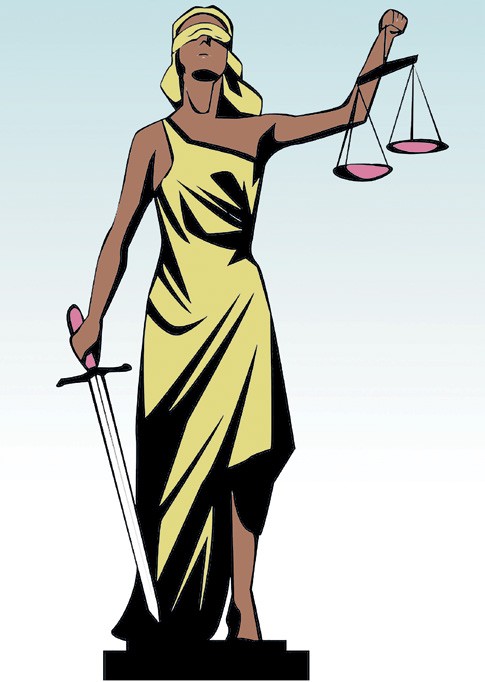Justice appears to be for sale in Nigeria to anyone with a deep pocket. This is our current reality and the earlier we acknowledge this problem, the quicker the fix. Is it not ironic that the judiciary, which should be the bastion of our democracy, is now its undertaker?
I have reached a factual conclusion that the corruption in the judiciary is deep and only a drastic measure can reverse the ugly development. Some of the judgements delivered by the courts in this electoral cycle have been shocking, baffling and perplexing, to say the least.
The most notorious culprit is sadly the Supreme Court, the highest court in the country, with its latest rulings on the Yobe North APC Senatorial District and the Akwa Ibom North-West APC Senatorial District tickets. The controversial rulings declared Senate President, Ahmad Lawan and Senator Godswill Akpabio as duly elected candidates.
The irony of this development is that both men did not participate in the senatorial primary elections. They were presidential candidates who participated in the APC presidential primary and lost. They could not have obtained forms to participate in the Senate primary because it is a violation of the Electoral Act, although the Act stipulates conditions where a party may conduct another primary (such as in event of the death of a candidate or voluntary withdrawal of candidacy).
The Supreme Court’s decision has been met with widespread criticism, as many believe that the court has become a hub for the sale of justice, with the highest bidder getting the most favourable judgment. Coincidentally, Akpabio is widely credited for this famous quote “What money cannot solve, money can solve it.”
This is not the first time Supreme Court justices have been called out over questionable judgements. The court has been accused of violating common sense and the will of voters, resulting in several controversial decisions that have upset the public. This was seen in the case three years ago in Imo State, where the apex court declared Hope Uzodinma, who was not even the first runnerup, winner of the governorship election in the state, to the bewilderment of many.

These kinds of decisions are a threat to our political system and they undermine the people’s faith in government.
Judicial experts and other legal luminaries have joined members of the public to express grave concerns over the level of corruption in the judiciary and its effect on the country. This is a fervent call for the immediate and complete overhaul of the judiciary, as corruption among the judges and justices has become a clear and present threat to our existence.
Nigeria is facing a crisis in its justice system, with corruption and abuse of power by powerful and influential people becoming normalised within the country’s courts. Yet, no one cares anymore.
There is also zero accountability and many are questioning why the country has descended into a pattern of violent self-help. This is because the absence of accountability and lack of trust in the system is not just a recent occurrence.
There are instances in the past that bear evidence of this sordid decline. One such instance took place in 2007, during Nigeria’s most venal elections midwifed by the then President Olusegun Obasanjo and the disgraced INEC boss, Prof Maurice Iwu.
A large number of the offices contested ended up before the judges, who ultimately decided the winners and losers as against the democratic practice of the people’s choice. This led to intense pressure being placed on the judges and justices, and allegations of corruption were made against some of them. One such judge was Thomas Naron, who presided over a tribunal involving the governorship of Osun State in South West Nigeria.
Naron was found to have engaged in inappropriate telephone exchanges with Kunle Kalejaiye, a Senior Advocate of Nigeria representing the then governor of Osun State, Prince Olagunsoye Oyinlola, in whose favour the tribunal eventually decided. Naron’s actions resulted in him being terminated from his judicial career by the National Judicial Council (NJC) in 2013.
Kunle Kalejaiye was also found guilty of violating the rules of professional conduct in the legal profession by the Legal Practitioners Disciplinary Committee (LPDC) and was disbarred in 2015. However, his disbarment was later overturned by the Supreme Court, which found that his right to a fair hearing had been violated on the technicality that one of those who participated in the decision to debar him was not present at the hearing. This decision was a departure from previous Supreme Court decisions, which had taken a strong stance on judicial integrity.
More recently, in 2021, the Supreme Court made a similar ruling in a case involving three lawyers who had been disbarred for serious professional misconduct. However, unlike Kalejaiye’s case, the court ordered a retrial of the lawyers by a new panel of the Legal Practitioners Disciplinary Committee, without any explanation for the different treatment in two extremely similar cases and both of which hinged on the very delicate subject of integrity within the hallowed chambers of the bar and the bench and for the common man places his very last hope.
Yet, the experience in Nigeria is that the tendency to make decisions on a whim has become a characteristic of the country’s highest courts, with varying rulings being made on matters of judicial integrity. This has led to confusion and a lack of confidence in the country’s justice system.
The situation in Nigeria highlights the need for a concerted effort to address corruption in the country’s courts and restore the integrity of the justice system. In addition to corruption, the independence of the judiciary is also under threat, as many believe that the judiciary has become a political tool, being used by those in power to achieve their own ends. This is evidenced by the recent cases of imposition of candidates, such as in the case of Akpabio and Lawan.
The integrity of the justice system is crucial for the stability of Nigeria and it is imperative that reforms are implemented to ensure that justice is not only done, but also seen to be done. The public is calling for a judiciary that is impartial, independent, and transparent, and one that is not influenced by outside forces. The 2023 elections are here. We are less than two weeks away from the date when Nigerians will go to the polls to choose a new president and elect federal lawmakers and the penchant of politicians to challenge perceived and real irregularities and malpractices in the process means that the integrity of the justice system is essential for free and fair elections.
I advise that the reforms are initiated within the judicial system and in a timely manner, so that the integrity of the justice system is restored, and the public can have faith in the rule of law. This is crucial for the future of Nigeria, as a corrupt and unreliable justice system is a bad omen for the 2023 polls, and undermines the efforts of all those concerned to clean up the system and make the elections as free and fair as possible.
Personally, I believe that in order to restore the integrity of the justice system, it is crucial that the Federal Government and all relevant stakeholders take decisive actions to address the issue of corruption in the judiciary. This can be done by increasing transparency and accountability in the decision-making process, ensuring that judges are held responsible for their actions, and by creating a system where whistleblowers can safely report instances of corruption.
I also recommend the introduction of strict measures to ensure the impartiality and independence of the courts. The formation of a special task force, composed of experienced lawyers and other legal professionals, could be a step in the right direction. This task force could be tasked with investigating and prosecuting judges and justices who engage in corrupt practices, and making recommendations for systemic reforms to prevent corruption in the future.
The situation in Nigeria’s justice system is dire, and the corruption and abuse of power that have become normalised in the courts should be frontally confronted.
The judiciary must reinvent itself, act quickly and decisively to address these issues and restore public confidence in the justice system. Only then can we be assured that justice is truly blind. The future of Nigeria depends on the reforms that are implemented in the coming months, as a corrupt and unreliable justice system is a bad omen for the future of the country.







